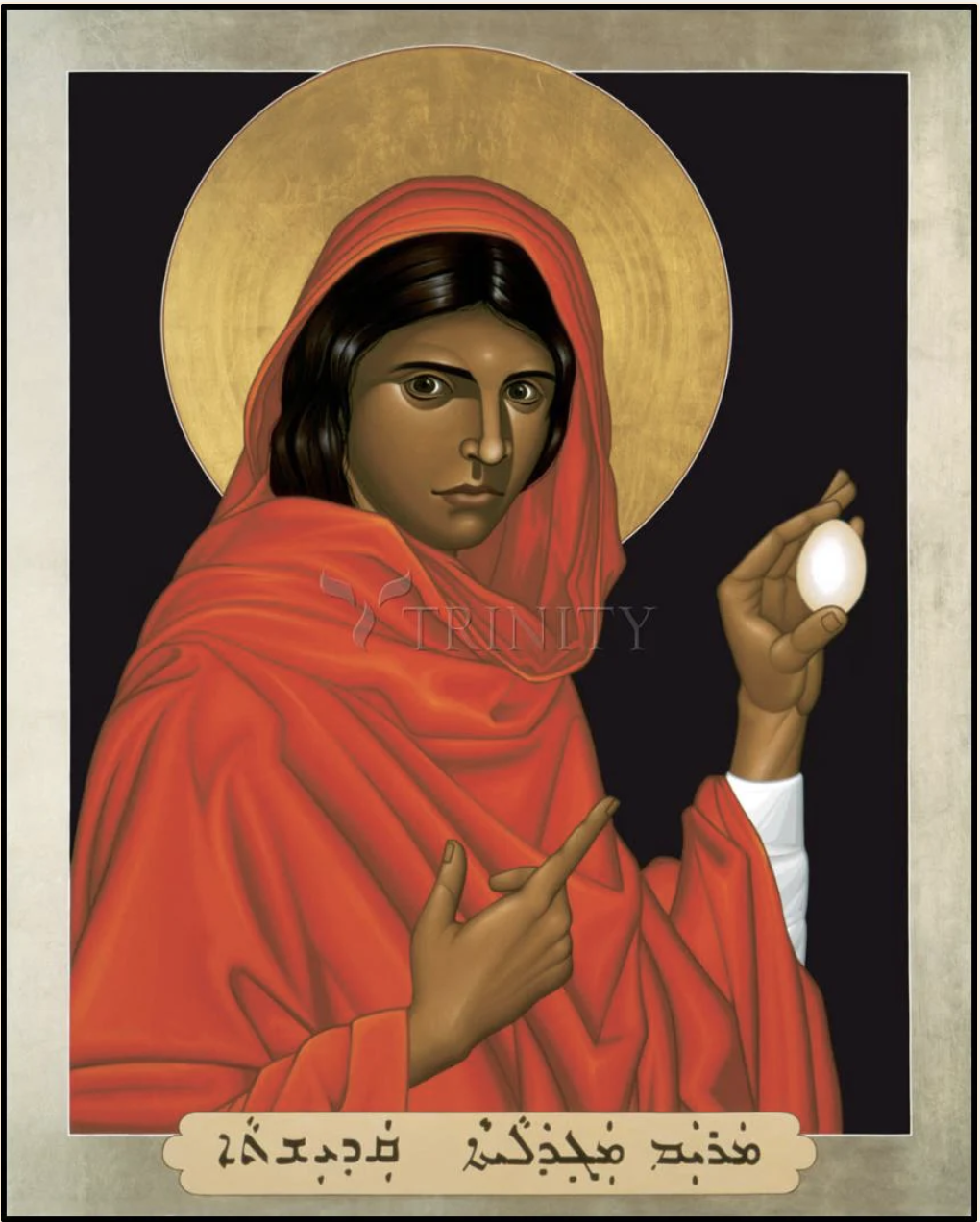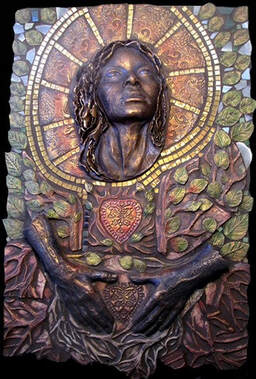Amy Courts
Written Things:
sermons, songs, etceteras
A preface: This sermon did not come easily. In fact, it didn't really come at all. After literal days of mulling and chewing and writing all the notes and ideas and plans, and spending eight focused hours into the wee hours of Sunday morning when I finally gave up, I still showed up to worship with maybe five of the paragraphs you read below. So I invited the Spirit to move as She willed, to speak as She wished, and this is what came out. For this reason, it's longer by a lot and doesn't read the way my typical sermons might. But it is precisely what was needed, and even garnered applause at the end -- which never happens. Thanks be to God and the Spirit! So good morning! I wasn't kidding when I said that Louis could preach today because it would probably be better than what I came up with in the last 20 minutes. The reality is this week has been a mess, I have been way too in-my-head, trying to find exactly what I needed to say and find -- There's a lot of verses on this page! Where, what am I looking for?! What am I going to find?! That has been the stress, along with like driving to and from other states, so I am here, we are here together, and that is the good, that is the good beautiful, joyful thing that I am clinging to right now, even as I beg the Spirit to come and be with us and breathe through whatever it is that comes out of my mouth. Amen.
So today, we do begin our sermon series through the book of Philippians on Finding Joy in the Ordinary, and I get to start us off by simply acknowledging that joy is often hard to find. Pastor John mentioned a couple weeks ago -- last week? -- we did this Enneagram thing. How many of you know the Ennea- Anybody? There's like three of you and half of you are staff. It's this personality thing that kind of shows you where your passion is, where your focus can be, and kind of what drives you internally. And for me, I am an Enneagram 4: I am the Individualist. I am the Creator. I want everything I say to be perfect and special. And I love sad things! I love feelings, I love big feelings, I love getting really deep -- really deep -- in the yuck and pulling it apart and going, “Where is the life here?” So that's what I get to do today. We'll see if it actually gets done! The reality is that especially within the the Queer community, of which I am part, in the United States we know deep in our bodies and our bones how hard it can be to find joy and to be full of joy in a world that so often hates us and wishes that we would just not be this. Paul knew it too. The people that he spread the gospel to and who took that gospel and spread it further -- they knew this in their bodies and their bones. And so I am going to begin at the end of Paul's teaching here, in verse 27 where he says, “Only live your life in a manner worthy of the Gospel, so that I will know you are standing firm in one Spirit, striving side by side with one mind, for the faith of the gospel." And I start here because this is the instruction, the commendation, that anchors everything else that Paul is going to say to the Philippians in the coming chapters. And it can anchor us as well, as we move into the rest of it, and as we move into our days.
0 Comments
JUDAS (New Version)3/29/2024 As I contemplate again Maundy Thursday, and Jesus's giving of his whole self to betrayers and deniers, I am reminded by his command to love as he loves just how impossible that is to do in everyday life. Maybe one day. "JUDAS" (c) 2022 Amy Courts Music
Good morning, beloved of God. Today we enter into Holy Week, into the final few days of Jesus’s life. As I read this familiar story again this year, I was drawn to the ways in which it begins and ends with the presence of Christ’s closest friends. Throughout this recounting of Jesus’s last days, hours, meals, and moments, I can't help but notice the real people who showed up in fearful and risky, costly, and cowardly ways.
And so As I think about this story and all the ways it invites us to witness grief, the first thing I am conscious of is our culture’s general aversion to the process of grieving, mourning, wailing, and witnessing -- especially publicly. We tend to be stoic people, uncomfortable with grief and intolerable of the quiet, steadfast presence mourning requires. So when we are grieving, we offer apologies for feeling like a burden, and when our friends grieve, we offer platitudes, like “everything happens for a reason,” and “God never gives us more than we can handle” (which are both garbage by the way). We do not like, nor do we understand the purpose and power of grief, so we often interrupt it and speed it along. We rush through the passion to the Resurrection, skipping some of the most important and transfigurative moments along the way. And so today, I am inviting us to do the opposite, and to do it together. This message was originally given on the fifth Wednesday of Lent, March 13, 2024, at Gethsemane Lutheran Church in Hopkins, MN. The livestream of Holden Evening Prayer lenten worship may be viewed here. This evening's scripture text is Colossians 1:17-23a (below) “HE GIVES ALL THINGS THEIR FULL MEANING 17He is the one who is in first place and the head of all things. It is in him that all things come together and find their full meaning and purpose. 18He is also the head of his body on earth, the sacred family. He is in first place before all other things, the first2 to rise to life from among those who have died. In this way, he remains chief in all things. 19It made our Great Father’s heart glad to have all that he is living in his Son. 20Through his Son he brought together everything in the spirit-world above and on the earth below into harmony with himself, making peace through his lifeblood poured out on the cross. OUTSIDERS BECOME INSIDERS 21At one time you were outsiders, separated from Creator by your hostile thoughts that led to evil ways. 22But now in the physical body of the Chosen One, through his death, he has turned you from an enemy into a friend. He did this so that you can stand without shame before the Great Spirit as a people who have been made holy, washed clean from guilt and free from all accusation. 23Yes, all this is yours as you make your path straight on the road that leads to this hope, trusting in the good story that you have heard.” — First Nations Version: An Indigenous Translation of the New Testament by Terry M. Wildman In the fall of 2017 when autumn trees were bursting with color, Osage Theologian George E Tinker stood before a Lutheran audience in St Paul and said, “Beautiful place y’all have here. So how’d you get it?” He recalls it landing as intended -- awkwardly and uncomfortably -- but his query was and remains important: “How did Lutheran folk end up with so much Indian land across the northern tier of the U.S., including in Minnesota? [It] is,” he writes, “a theological and ethical question that most American folk (not just lutheran folk) never get around to asking themselves.” I want us to meet George Tinker precisely because he’s an American Indian who asks the uncomfortable questions about the history of this Place and its people, from the particular “perspective of Native Peoples who were displaced under the Doctrine of Discovery and all the anti-Indigenous laws it birthed” for the benefit of euro-christian settlers, including us.
But first I want to root us in why exploration of Indigenous Christian Wisdom is so important in this Place: We are a predominantly white-bodied Lutheran congregation in a state that was settled by a largely Scandinavian lutheran population. We live in that historical context, in community with the displaced, in this Place with a capital P. So it is crucial for those of us who benefit from European expansion to examine how our culture has interacted and at times clashed with others, across generations. And to get there, we have to understand the “Doctrine of Discovery” and its impact on Tinker’s Native ancestors and living relatives. Mary the Tower (John 11:17-27)2/21/2024
Good evening, Beloved of God, and welcome to Lent, and to this journey into some of our historical church roots through ancestors of the faith you may or may not know. As we’ve mentioned, over the course of the next 6 weeks, we will be introducing you to towering ancestors from each continent whose witness and ministries have shaped the church eternal and guide us even still, whether or not we knew their names before now.
And it’s my honor tonight to peer into the life and ministry of one of our most misunderstood, misidentified, troped, and erased ancestors whose life offers deep roots in the ground and wide-ranging perspective at its spire. Her name is Mary called Magdalene, or -- literally, in the Greek -- Mary, the Tower. Hold on to her name, and let’s begin where we meet her first in the Gospels, which is not John 17 but Luke 8:1-3 where she is named in brief alongside “many women” who became Jesus’s disciples after he healed them of illnesses and demons. These women, according to author Cynthia Bourgeault, form an “opposite and equal female presence” among Jesus’s followers which tells us “participation in Christ’s inner circle was determined not by gender but by their degree of understanding and commitment. And all four gospels infallibly place Mary called Magdalene within that inner circle.” Back to Luke 8: Mary called Magdalene’s particularity here is that she was “liberated from seven demons.” Now, further into Luke 8 we meet the only other possessed person whose demons were also named with particularity -- he’s the man so tormented by the demons named Legion that he’s literally been living in a graveyard. I’m naming him here to underscore that demon possession ravaged a person to such a degree that those who were freed from many at once, be it seven or Legion, would’ve had a uniquely powerful understanding of what it meant to be liberated and transformed. We’ll come back to this. The next time Mary Magdalene is named is when all four gospels, which rarely agree on anything as a quartet, place her as a witness to Jesus’s crucifixion, burial, and as the first person to Jesus’s empty tomb. Already, we can see that her importance within Church history has been diminished; her roots -- our roots -- haven’t been well-tended. This sermon was originally preached on February 11, 2024 at Gethsemane Lutheran Church in Hopkins, MN. The livestream of our contemporary and traditional services may be viewed here and here. Today's gospel text: Mark 9:2-9 Good morning, Gethsemane. How many of you read The Very Hungry Caterpillar before today? And how many of you have actually seen a caterpillar transform into a beautiful butterfly? I love butterflies and this story so much because they show us in vivid color what a caterpillar must do to Become, with a capital B. They must undergo full metamorphosis.
In nature, this is an extraordinary process of utter, total transformation -- the transfiguring from one kind of being and body to another one entirely. For butterflies, that process happens across four stages -- egg, larva, pupa, and adult. And According to Wonderopolous, an educational hub created designed for kids but also perfect for my own grown-up imagination, it is “During this Pupa stage that the caterpillar's old body dies and a new body forms inside a protective shell known as a chrysalis…. There, the caterpillar's body digests itself from the inside out. The same juices it once used to digest food as a larva it now uses to break down its own body…into cells called imaginal cells. Imaginal -- or, imagined -- cells are undifferentiated, which means they can become any type of cell. Many of these imaginal cells are used to form the new body.” What’s striking to me about that whole process -- aside from the fact that it’s magical and gross -- is that 80% of all animal species do it. Not in the exact same way, but they go through metamorphosis. It also strikes me that biologically, anyway -- and as far as we know so far -- humans don’t. Breath & Baptism | Mark 1:4-111/7/2024 This sermon was originally preached on January 7, 2024 at Gethsemane Lutheran Church in Hopkins, MN. The livestream of our contemporary and traditional services may be viewed here and here. Read today's gospel text (Mark 1:4-11) here. Breath and Water.
The two elements apart from which we literally cannot survive are the primal roots of today’s text. And with these two elements, time begins to collapse, as Mark invites us into Jesus’s story through his rebel cousin John, who is the radical and revolutionary fulfillment of Malachi and Isaiah’s ancient prophecies. A crazy man who lives in the wilderness on locusts and wild honey, clothed in camel hide and leather, and whose head will eventually be delivered on a platter to King Herod’s stepdaughter. Were he born in our era, he’d be the kind of revolutionary you might hear preaching on a street corner or leading a protest for revolution. He lives his life on the margins, preaching radical transformation of people and culture, ritualized in baptism. And, as God’s messenger and the forerunner of Christ the Mightiest, John has traction with “all the people” joining him at the Jordan from throughout the land of Judea and Jerusalem. Which I say to underscore the simple, if implied, fact that there is a significant socio-political & cultural shift in progress that makes John’s radical presentation and message attractive and enthralling to “all the people.” We know from other texts and histories surrounding Jesus’s birth and early life, including his mother’s own song in Luke 1, that Palestinian Jews like Jesus and John lived under the harsh and heavy boot of Roman occupation.The occupation was so cruel, in fact, that by just a few decades after Jesus’s death and resurrection, Jews rose up in violent rebellion against the Roman Empire waging the first of three major Jewish-Roman wars. Point being, revolutionaries rise when revolution is needed; radicals rise up when roots need tending. And both John and Jesus are among the rising. Tend to the Waiting | Isaiah 64:1-1912/3/2023 Good morning, Beloved of God and welcome to the season of Advent, the season of waiting and wondering and wandering. As I prepared to share with you this week, I was lost until late Friday night into yesterday morning, not just because we’re moving away from the gospel and into Isaiah, but because the Spirit was moving me away from my norms and into murkier, more personal territory.
So I spent more time than I ever have just…waiting. Pondering, listening, thinking, making notes on my phone, deleting notes from my phone, worrying that I might show up this morning with nothing, and waiting some more. Which, it turns out, is perfect for this day. Because while Advent heralds the Coming of Christ, Christ has not yet come. The holy mother is only 37 weeks along, and the Christchild is not yet ready to be born. There is still so much stretching, moving, and transforming to do before she’ll be ready to deliver; before her holy son will be ready to leave the warm safety of her womb and be born to a world that will eventually crucify him. Now, as a mother who endured what felt like a 13-year pregnancy, let me just say that these last weeks -- from 37 onward -- are perhaps the longest, most excruciatingly drawn out days of pregnancy, even for someone like me whose pregnancy began and remained a dream: Blessed are the Just (Matt. 5:1-12)11/6/2023 This sermon was originally preached on November 5, 2023 at Gethsemane Lutheran Church in Hopkins, MN. The livestreams of contemporary and traditional services may be viewed here and here. Read today's gospel ext (Matthew 5:1-12) here Good morning. I come to you this morning with a heavy, broken heart — with the kind of grief I can neither deny, diminish, nor divert, even for the sake of a sermon. I am tasked with preaching about what it means to be “Blessed” according to Jesus’s teaching, and what’s ringing in my ears, as we enter a season of stewardship and accountability, is how often we’ve heard it said that these beatitudes are promises for individuals seeking personal holiness and heaven, when what I see with today’s eyes are promises of grief and oppression to a group of people - Jesus’s disciples - who will all suffer unimaginable pain and persecution before their lives are over.
It’s no accident that The Beatitudes are the gospel for All Saints Day: a day when the veil between the living and the dead is thinned, when we remember and commune with all the saints who’ve gone before us, and light candles in honor of all who now surround us in the great cloud of witnesses. And this particular All Saints day is a day to grieve all the lives taken over these last weeks, days, and hours by the escalating genocide of Palestinians in both Gaza and the West Bank. Now, beloved, as much as I hate that word, as risky as it is to say, and as clear as we are that it must never be thrown around flippantly lest it lose its gravity, on this day of all days, as the dead surround and call us into communion, we must not provide coverage for evil through the words we choose and the ones we avoid. By Whose Authority? (Matthew 21:23-35)10/1/2023 This sermon was originally preached on October 1, 2023 at Gethsemane Lutheran Church in Hopkins, MN. The livestreams of contemporary and traditional services may be viewed here and here. Gospel Text: Matthew 21:23-35 Good morning, beloved of God.
Since this is my first week preaching here at Gethsemane and just my second week as your pastor, I thought I might give you a little background about who I am and how I walk in this world, and the things that trouble and move me as a queer bisexual woman and pastor who whose faith has shifted in some truly monumental ways over the last six years, to such an extent that I still follow Jesus, albeit in a different -- I say resurrected -- way. Firstly, I’m a bit of a bleeding heart rebel and always have been. From the time I was a kindergartner evangelizing to my teachers about Jesus and heaven, to my advocacy within my north Minneapolis community for my marginalized neighbors, what concerns me most is never “am I following the rules” but “who wrote the rules and who do they help and harm?” In other words, I have always been willing and ready to question authority, and I expect that wherever I might have or be given authority, including here, I will also BE questioned and held accountable to acting as if I believe what I say. AMY COURTSSermons + Songs + Poems Archives
June 2024
Categories |
Proudly powered by Weebly









 RSS Feed
RSS Feed